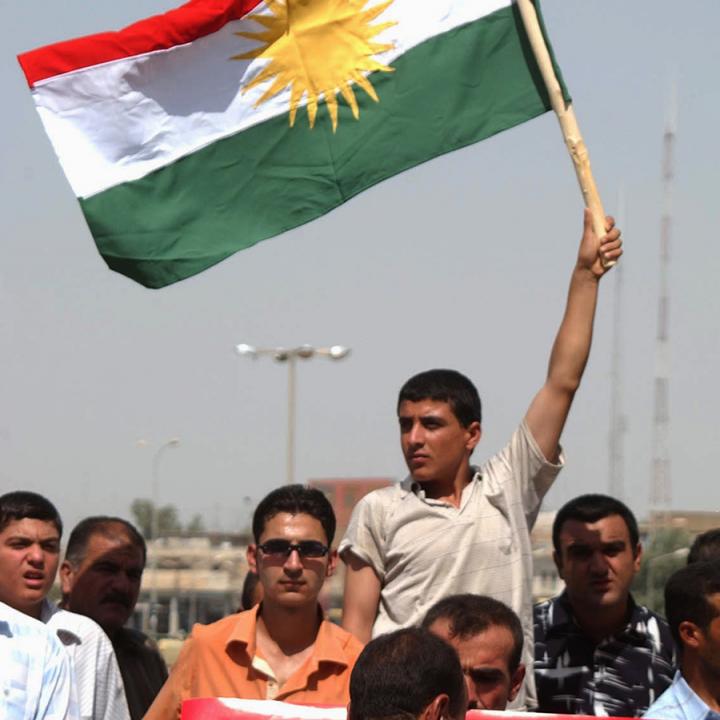
- Policy Analysis
- Fikra Forum
Fighting Corruption is Essential to Kurdish Independence

September 21, 2017
On September 25, 2017, the Kurdistan Region of Iraq will hold a referendum on independence and succession. An independent Kurdish state is something that Kurds have sought for generations, but the notion of a referendum among Iraqi Kurds has gained strength in recent years due to disintegrating relations with Baghdad. While the region faces numerous hurdles to actual independence, purposefully and earnestly tackling corruption is key to the success of an independent Kurdistan.
There are, of course, questions regarding the validity of any referendum and the actual impact that it will have, but Iraqi Kurds seem optimistic that an independent Kurdistan is on the horizon. Driving this optimism is the role of the Kurdish Peshmerga in fighting with Iraqi military forces to liberate Mosul and diminish the Islamic State’s power. Kurds are of the opinion that Baghdad is not providing proper recognition for the Kurds’ sacrifices, both in blood and treasure.
Additionally, Erbil and Baghdad have yet to reach agreement on the issues of oil revenues and geographic boundaries. Precarious oil markets, disputes with Baghdad over oil revenues, and the fight against the Islamic State have only further exacerbated the relationship between the two. All of this aside – or perhaps because of this – the Kurds are more resolute than ever to head to the polls.
Iraqi Kurds are not the first semi-autonomous region to call for independence from a central government, and they will certainly not be the last. Leadership in Erbil and Sulaymaniyah would be wise to note the lessons of previous independence movements, particularly those that have failed. One recent example is South Sudan. Kurdistan today shares many similarities with South Sudan before it became an independent state — both are petroleum-rich, landlocked, have harrowing relationships with the central government, and contain at-risk ethnic and religious minorities.
In 2011, South Sudan declared independence, and since then, the situation has deteriorated significantly. Corruption was a major contributing factor to the state’s failure. The mismanagement of resources by corrupt government officials strained the government coffers, and two rival political factions are fighting to control the proceeds of corruption. Additionally, opaque and corrupt business practices led to a lack of investment, stunting any hope for economic growth.
To prevent corruption, an independent Kurdistan must actually enforce existing laws with steeper penalties and create additional anti-corruption measures. The Kurdish Regional Government (KRG) created an Integrity Commission designed to be an independent body under the supervision of Parliament that works to prevent and investigate corruption by government officials.
The first step is to have the Integrity Commission equally and transparently enforce existing laws criminalizing corruption. Iraqi law penalizes bribery of public officials, but these laws are not equally enforced. Further, the current penalties are insufficient to deter corruption, so they must be increased in order to be more effective.
Through the Integrity Commission, the KRG is in the process of implementing a biometric payroll system for government employees to reduce expenditures and government waste. Another of the planned initiatives is a “services program,” which aims to limit the number of opportunities for corruption by decreasing government contact through simplifying citizen-government interaction. This program can also play a role in limiting excessive bureaucracy for companies. For example, a simplified “one-window” corporate registration process would limit opportunities for low level government employees to seek bribes and would help give foreign companies confidence in the system.
Dr. Ahmed Anwar, head of the Integrity Commission, announced that there have already been close to 380 cases referred for investigation. Earlier this year, the Kurdistan government referred twenty cases involving government employees to the Integrity Commission for investigation. For anti-corruption measures to take hold, however, they must start at the top. If private citizens are to take steps to end corruption, they must see their leaders being held to the same standard. Corruption among political leaders saps faith in the institutions and system, which only perpetuates the problem.
The Kurdistan government must ensure that any investigations or prosecutions are conducted in a transparent and equal manner to prevent the Integrity Commission from being viewed as a political weapon on the one hand or ineffectual on the other. Kurdistan could learn lessons from Baghdad’s previous experience dealing with corruption. In 2016, the predominantly Shia’a Iraqi Parliament lodged corruption charges against then-Defense Minister Khalid al-Obeidi and Finance Minister, Hoshyar Zebari, a Sunni Arab and a Kurd, respectively. Given that other lawmakers who openly admitted to graft and corruption went unpunished, the motives of the charges were questioned.
While commendable in theory, the recent steps by the Integrity Commission are only the bare minimum.
Foreign investment is integral to the success of an independent Kurdistan, and strengthening anti-corruption initiatives is essential to attracting investment that has recently gone elsewhere, partly due to the complexity and opacity of doing business in the region. The World Bank ranks Iraq as 165 out of 190 countries in its 2017 Ease of Doing Business index. Simplifying and making the operating requirements for foreign companies more transparent will achieve the dual goals of reducing opportunities for corruption and providing a welcoming operating environment for foreign companies.
Corruption is a massive problem for both Iraq and Kurdistan, and the matter will only increase in importance after independence. An independent Kurdistan is not necessarily destined to be a failed state, but it must take proactive steps to prevent widespread corruption if it is to be a truly successful state.


